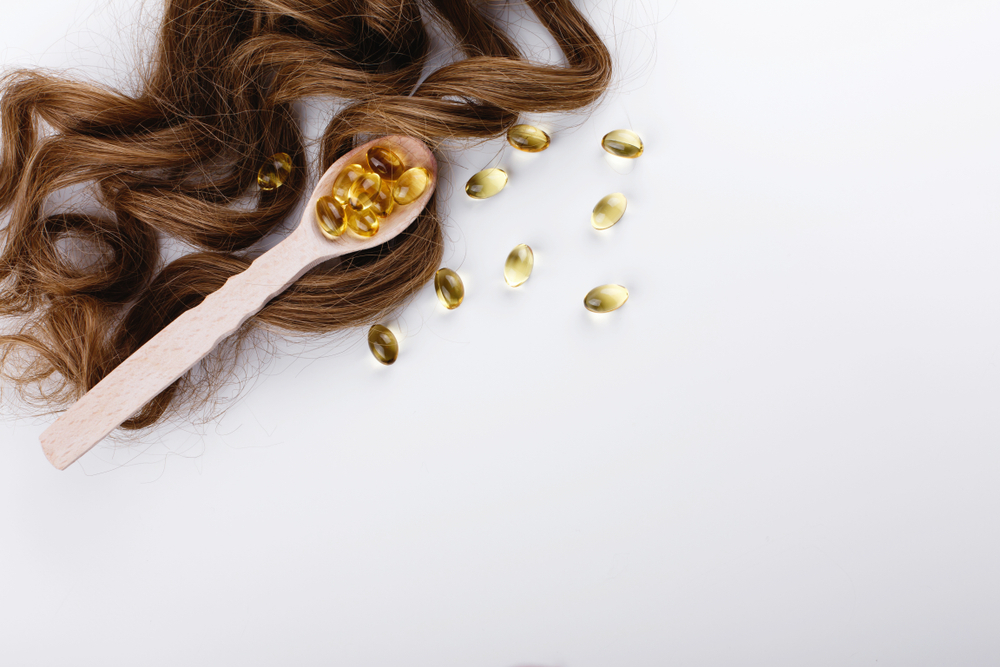If you want a shiny, voluminous and healthy mane, you should make sure you have enough vitamins for your hair. Otherwise there is a risk of hair loss!
Shiny, full and long hair is no coincidence. Vitamins are essential for healthy hair growth. If there is a deficiency, this can lead to hair breakage and hair loss. We introduce you to the most important vitamins for beautiful, healthy hair and explain how you can prevent a vitamin deficiency.
1. Vitamins for the hair: Vitamin A
Vitamin A – also known as retinol – strengthens the hair and keeps it smooth. It also has a positive effect on hair growth and the fat synthesis in the hair follicle. Abundant amounts of this vitamin are contained in organic eggs, liver or salmon. Good to know: The precursor of vitamin A is beta-carotene and is found in many vegetables and fruits such as kale, pumpkin, carrots, spinach or paprika.
2. Vitamin B
The group of B vitamins is extensive and the most important for healthy hair. It ensures a healthy scalp as the basis for beautiful, healthy hair and stimulates the production of sebaceous glands and metabolic processes in the hair roots.
- Vitamin B2 ensures beautiful hair and healthy scalp and is found in salmon, cheese or almonds. The ideal daily requirement is around 2 milligrams.
- Vitamin B3 (also called niacin) strengthens the hair structure, regulates sebum production, protects the scalp from inflammation and coordinates metabolic processes in the hair roots. The vitamin is found in meat, fish, peanuts and dried apricots. 11 to 16 milligrams daily are recommended.
- D-panthenol is a precursor of vitamin B5 and as an additive in shampoos and lotions has a calming effect on the sensitive scalp and makes the hair easy to comb.
- Vitamin B5, also known as pantothenic acid, delays hair graying and is found primarily in mushrooms, broccoli and liver. A lack of pantothenic acid prevents the formation of sufficient color pigments in the hair fibers. The result: graying hair faster. The recommended daily dose is eight to ten milligrams.
- Vitamin B7, also called biotin or vitamin H, is the beauty vitamin par exellence and protects against hair loss, provides more shine, prevents split ends and inflammation of the hair root. Biotin, however, not only supports beautiful hair, but also healthy skin and strong fingernails and is found in foods such as bananas, strawberries, spinach and whole grain products (oat flakes). The recommended daily amount is 0.25 milligrams of biotin daily. Those who permanently take too little biotin risk hair breakage and hair loss.
- Folic acid improves the oxygen supply in the blood up to the hair roots and thus counteracts hair loss. Folic acid, which belongs to the B vitamins, is found in cereals, asparagus and liver. The recommended daily intake is 0.16 to 0.4 milligrams.
3. Vitamin C
Vitamin C is known above all for its stimulating effect on the collagen production of the skin. But it also has a positive effect on hair growth, as it promotes the blood circulation of the scalp. At the same time it increases the availability of iron in the bloodstream and supports metabolic processes in the roots.
4. Vitamin E
The antioxidant vitamin E protects against environmental influences such as UV radiation and hair loss. At the same time, it supports hair growth and ensures strong hair. A daily amount between 11 and 15 milligrams is recommended. A deficiency can lead to brittle and fragile hair. Sufficient vitamin E is found in tomatoes, almonds or raspberries.
Other important nutrients for beautiful hair
- Iron: The trace element must not be missing in the nutrition plan for healthy hair. Iron deficiency is one of the primary causes of hair loss. Iron is responsible for the transport of oxygen in the blood and thus supports many growth processes. Iron deficiency can be prevented by increased consumption of lentils, spinach, soya and meat.
- Zinc: This trace element supports hair growth by being responsible for the formation of keratin and collagen. Zinc is mainly found in legumes and nuts. A zinc deficiency can lead to hair loss.
Vitamins for the hair: From the outside or the inside?
A sufficient supply of vitamins and trace elements such as zinc ensures healthy, shiny hair and is primarily achieved through a balanced diet with fruit, vegetables, meat and fish. Who does not like however certain food, can seize also to food auxiliary means. We are talking here about so-called nutricosmetics. These include capsules or drinking ampoules that are enriched with vitamins (biotin, zinc, etc.). In comparison to creams or lotions, which (may) only act superficially on the skin, capsules etc. are primarily intended to combat skin and hair problems from within.
A decisive factor for their effectiveness is that the ingredients are bioavailable. Because when taken orally, the active ingredients are metabolized and distributed throughout the body via the blood.
Ideally, they should be used as a cure over a period of four to twelve weeks. A shorter intake often brings no visible effects. If taken over a long period of time, the supplements can quickly lead to oversaturation.
Dietary supplements such as capsules and tablets can interfere with each other or even lead to intolerance when taken simultaneously. Important: Always consult your family doctor or pharmacist!

